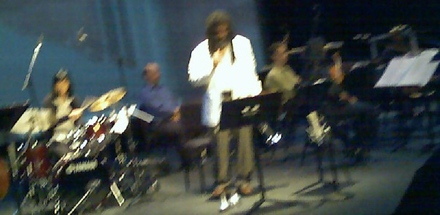Don't be scared off by the epic scope of the three-night civil-rights music opus "Ten Freedom Summers," or by the abstractionist reputation of its author, trumpeter-composer Wadada Leo Smith. The collaboration with Jeff von der Schmidt's nine-piece Southwest Chamber Music ensemble has a quiet integrity that embraces you like a friend.
FRIDAY.
The first 100-minute evening was split between Smith's Golden Quartet (featuring pianist and Malcolm X opera composer Anthony Davis, longtime Golden bassist John Lindberg, and essential New York drummer Susie Ibarra) and von der Schmidt's nonet, each group playing separately most of the time. The G.Q. launched into the roil and buzz of the leadoff segment, themed on the U.S. Supreme Court's divisive 1857 Dred Scott decision -- and, after an excited buildup, plunged to a sudden stop. Strangled sounds of disbelief squeezed out of Smith's horn; the rest of the Quartet engaged in querulous colloquy; Smith returned with a clarion protest and ended with a somber sigh. The Dred Scott decision had been read. (I flashed on a weird coincidence: The hotly contested baseball World Series, pitting St. Louis against Texas, red against blue, had ended minutes before on the very Missouri soil where much of the Dred Scott drama played out.)
In subsequent portions dedicated to Malik al Shabazz (Malcolm X), voter registration and the Vietnam War wall memorial, the Golden Quartet performed a function well suited to an improvisational unit: representing strong individual currents that nevertheless cohered into a chosen union. Davis' piano smoothed dissonances with a delicate touch; Lindberg's upright bass communicated subtle intellectual energy; Ibarra's drum kit thumped defining accents and scattered leaflets of encouragement. Smith's trumpet, with its myriad shadings and techniques, acted as the passionate narrative soul.
The Southwest Chamber nine, after sitting silent for 25 minutes, widened the same conversation that the Golden Quartet had encapsulated. Their harmonies, though marked with equal dissonance, gathered with such gentleness and chased each other with such openhearted goodwill that they never came off as harsh or antagonistic. Only when unison passages arose did the writing convey a deliberate stiffness or irony, as if to imply that consensus is always uneasy. The central string quartet (cellist Peter Jacobson, violist Jan Karlin, and violinists Shalini Vijayan and Lorenz Gamma) played with a special intuitive connection in both the scored and improvised passages. And paralleling Smith's role, the golden-toned harp of Alison Bjorkedal offered effective condensed commentary. With a wonderful variety of textures and strong emotional contrasts ranging from peace to fear to resistance, the Southwest cohort drew us into the violent murder of Emmett Till and the complex communion of the black church. When long, high sustains rose with the tension of a rocket launch to conclude the final section on JFK, we all felt the pull of hope.
To enhance the concert's welcoming atmosphere, images were projected behind the stage throughout -- films of notable incidents and people by Robert Fenz and Ismail Ali, along with live musician shots and linear contortions, all treated with grainy computer effects by Jesse Gilbert and Carole Kim.
Mr. von der Schmidt, who conducted much of the Southwest Chamber program, can be glad he took the chance on yet another boundary-breaking project. And Mr. Smith, who often sat with head humbly bowed when not required to play, can know he has made a valuable contribution not just to music, but to social communication. Approaching a subject usually associated with anger, he has chosen to concentrate instead on truth. And he has done it with love -- which, by the way, is what the name Wadada means.
SATURDAY.
Rosa Parks, Fannie Lou Hamer, Medgar Evers, Lyndon Johnson and more. I couldn't make it to this one.
SUNDAY.
Walking onto the stage, Wadada sensed some tension in the theater. It's important to him that listeners open up, so he sat down, closed his eyes and sat some more. We wondered what he was doing, then after a few minutes we got it and started to breathe. We were now prepared for Southwest Chamber's fuguing sustains and uneasily sliding string harmonies, the setup for an evening of anticipation and uncertainty.
The Golden Quartet brought twinkling magic, persistent blues, deathbed moans and dignified outrage to the story of Justice Thurgood Marshall, then twitched and choked with rage and defiance along with the Freedom Riders. The frightening yet gorgeous chords of the Southwest Chamber nine brought the correct apprehensive tone to desegregation and the Little Rock Nine. Smith's trumpet painted an American portrait of brave calm that reminded me of "Sketches of Spain," and his Golden Quartet took off running.
Lynn Vartan's vibraphone and Alison Bjorkedal's harp banged the Liberty Bell with strokes that rang through our heads like 500-volt shocks. But just when it seemed that the strings were pulling us together into a stately convocation and a Stravinskyan dawn, the drums crashed, the rhythm rushed, a Southern ballad countervailed, and the trumpet blasted the news that Martin Luther King Jr. had been killed.
King's voice sounded from the P.A., proclaiming that he'd seen the promised land. Smith hung around for a minute after that, not knowing (for a change) what to say, then murmuring, "I say freedom." Slavery, he suggested, is a state of mind.
Read my LA Times story here.
PHOTO BY FUZZY BROOKS.

